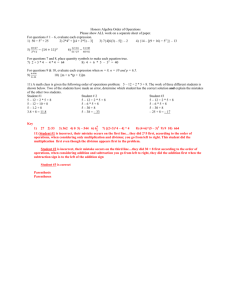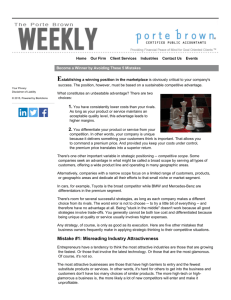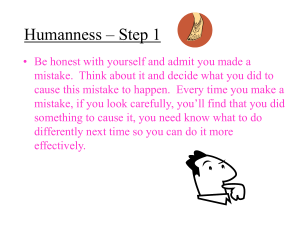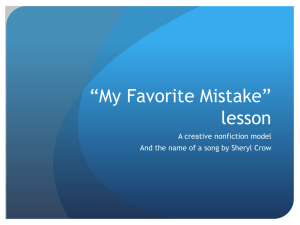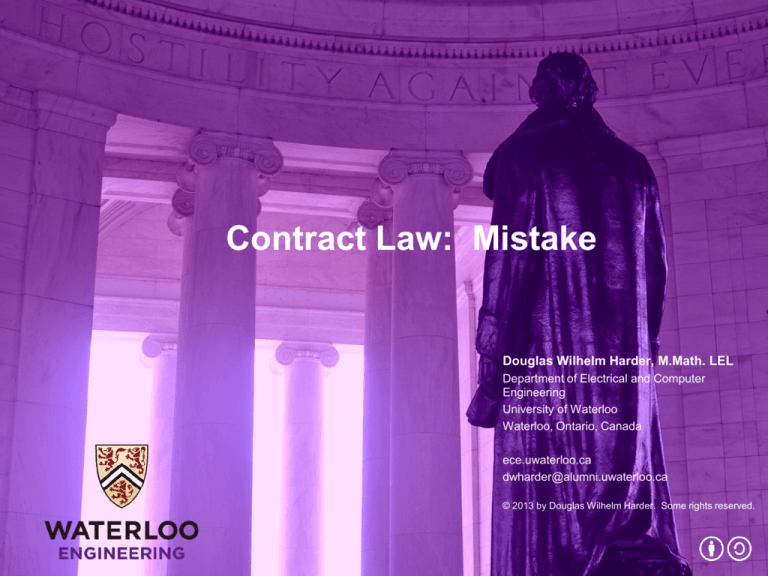
Contract Law: Mistake
Douglas Wilhelm Harder, M.Math. LEL
Department of Electrical and Computer
Engineering
University of Waterloo
Waterloo, Ontario, Canada
ece.uwaterloo.ca
dwharder@alumni.uwaterloo.ca
© 2013 by Douglas Wilhelm Harder. Some rights reserved.
Mistake
Outline
An introduction to the engineering profession, including:
– Standards and safety
– Law: Charter of Rights and Freedoms, contracts, torts, negligent
malpractice, forms of carrying on business
– Intellectual property (patents, trade marks, copyrights and
industrial designs)
– Professional practice
• Professional Engineers Act
• Professional misconduct and sexual harassment
– Alternative dispute resolution
– Labour Relations and Employment Law
– Environmental Law
2
Mistake
The Contract as a Starting Point
We have seen, through the parol evidence rule, that oral
communications prior to a written contract cannot, in
general, affect the terms of the contract
– There are a few exceptions, which we will continue to see
3
Mistake
Mistakes
What happens if there is a mistake in the written
contract?
– Are parties responsible for mistakes in the preparation of a
written document?
– Answer: it depends!
4
Mistake
Mistakes
We will look at three types of mistakes in contracts:
– Common
– Mutual
– Unilateral
5
Mistake
Common Clerical Mistakes
When both parties are agreeing on a contract and a
mistake occurs when the contract is drafted, this is
considered a common mistake
– It was a mistake made by both parties in the preparation of the
agreement
In such a case, a clerical error will allow a party to apply
to a court to rectify the contract
6
Mistake
Common Clerical Mistakes
When applying for rectification, the onus is on the
plaintiff to demonstrate that the contract differs from all
prior communications on the terms of the contract
– Therefore, it is always critical that you track all communications
regarding the agreement on the terms of a contract
7
Mistake
Common Mistakes
In the case of Courturier v Hastie, 1856, the sale of corn
was declared void because the corn, at the time of the
establishment of the contract, had already decayed
– The buyers were not liable for the price of the lost corn
– Both assumed that the corn existed when it did not
More recently, in Australia, there was McRae v
Commonwealth Disposals Commission, 1951
–
–
–
–
The commission sold McRae a shipwrecked tanker containing oil
The shipwreck, however, did not exist
In this case, the CDC had claimed that the contract was void
It was found, however, that CDC had promised the tanker
existed; thus, they were found to have breeched the contract
8
Mistake
Common Mistakes
Another example of a common mistake that did not void
a contract is the more recent Great Peace Shipping Ltd v
Tsavliris Salvage (International) Ltd., 2002
– Tsavliris was in the business of aiding and salvaging ships
– The Cape Providence required assistance and Tsavliris was told
the tug Great Peace was 35 miles away
– Tsavliris entered into a contract, but terminated it later when he
determined the tug was 410 miles away
– The court found that, while it would take 22 hours to cover the
distance, this would not have been a sufficient delay so that its
performance would be “essentially different from those the
parties envisaged when the contract was concluded.”
9
Mistake
Mutual Errors
What happens when both parties have a mistaken
understanding of an essential term in a contract?
Under such cases, the court will attempt to come up with
a reasonable interpretation of the contract before
declaring the contract void
10
Mistake
Mutual Errors
Consider Raffles v Wichelhaus, 1864, where two
contracting parties were mistaken about an essential
term in a contract
– The contract stated that the buyer would purchase cotton from
Bombay at a given price from a ship named The Peerless
“to arrive ex Peerless from Bombay”
– Unfortunately, there were two ships coming from Bombay, one
arriving in October and the other in December
– The buyer stated he was under the assumption the cotton was
on the October, while the cotton was delivered in December
– The courts could not come up with a reasonable interpretation
and therefore they voided the contract
11
Mistake
Unilateral Mistakes
The most difficult errors are unilateral: when only one
party makes a mistake
12
Mistake
Unilateral Mistakes
Consider the case of Hartog v Colin & Shields, 1939
– It was agreed that 30,000 hare skins would be sold at 10 d per
skin, amounting to £1,250
– The written contract, however, said “30,000 skins @ 10 d per lb”
– This reduced the amount to approximately £400 – less than a
third
The courts found that the plaintiff must have known the
defendant made an error and it was wrong to take
advantage of that error
13
Mistake
Unilateral Mistakes
14
In Canada, however, there has been a more recent
precedence: Imperial Glass Ltd. v Consolidated
Supplies Ltd.
– After receiving the dimensions of a window over the phone, an
employee of the defendant calculated 202.62 sq. ft. instead of
2026.24 sq. ft. resulting in a quote for $2000
– Based on this number, the appellant submitted a bid
– Further communications included:
We confirm herewith our quotation of $2,000.00 for supplying the
following Twin-Seal Units for Kitimat Elementary School.
...
It is to be understood that the above quotation is based on the
number of units and sizes as indicated and any changes will call for
a revision of this quotation.
http://www.schuettlaw.com/course/2011/Session%204/cases/1960%20BCCA%20Imperial%20Glass%20v%20Consolidated%20Supplies.HTM
Mistake
Unilateral Mistakes
15
Only after the order was placed was the mistake noticed
and the defendant attempted to withdraw from the
contract
The court determined that the behaviour of the plaintiff,
while seriously unethical, did not constitute fraud
– The court did not relieve the defendant for their mistake
http://www.schuettlaw.com/course/2011/Session%204/cases/1960%20BCCA%20Imperial%20Glass%20v%20Consolidated%20Supplies.HTM
Mistake
Unilateral Mistakes
A more recent case is Belle River Community Arena Inc.
v W.J.C. Kaufmann Co. et al. saw a subtle distinction
– The defendant is a contractor who submitted a bid that was
substantially lower
– The bid was $641,603 being $70,800 less than the intended bid
– The tenders were to remain open for a period of 60 days
– While the plaintiffs opened the bids, they did not immediately
proceed to accept the Kaufmann bid
– The next morning, Kaufmann sent the following:
Re new Tri-Community arena building please withdraw our quotation
dated January 11, 1973 due to a serious error in our tender.
http://www.schuettlaw.com/course/course%20materials/Cases/Tender%20Contracts/Mistake%20in%20Tender/1978%20-%20Belle%20River%20v%20Kaufmann%20-%20Appeal.htm
16
Mistake
Unilateral Mistakes
A more recent case is Belle River Community Arena Inc.
v W.J.C. Kaufmann Co. et al. saw a subtle distinction
– The plaintiff, never-the-less, informed Kaufmann that their bid
was accepted
– No contract was ever formally presented to Kaufmann
– Instead, the plaintiff went with the next lowest bidder and then
sue for $15,091, the difference
– The court found that because no formal contract had ever been
offered to Kaufmann, the contractor had never actually refused
to honour its tender
– In the United States, if a mistake in a tender is known to a party
accepting tenders, the tendency is to side with the contractor in
any case where the bid is accepted under such terms
http://www.schuettlaw.com/course/course%20materials/Cases/Tender%20Contracts/Mistake%20in%20Tender/1978%20-%20Belle%20River%20v%20Kaufmann%20-%20Appeal.htm
17
Mistake
References
[1]
[2]
[3]
D.L. Marston, Law for Professional Engineers, 4th Ed., McGraw Hill, 2008.
Julie Vale, ECE 290 Course Notes, 2011.
Wikipedia, http://www.wikipedia.org/
These course slides are provided for the ECE 290 class. The material in it reflects
Douglas Harder’s best judgment in light of the information available to him at the
time of preparation. Any reliance on these course slides by any party for any other
purpose are the responsibility of such parties. Douglas W. Harder accepts no
responsibility for damages, if any, suffered by any party as a result of decisions
made or actions based on these course slides for any other purpose than that for
which it was intended.
18




